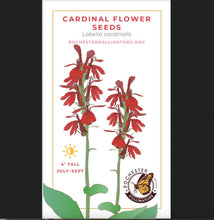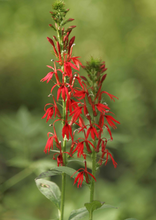Cardinal Flower (Lobelia cardinalis)
Native Perennial
Seed Count: approx. 150
Days to Germinate: 60 days of cold, moist stratification is necessary; see https://rochesterpollinators.org/pages/winter for more info
Depth to Sow: 1/4"
Seed Spacing: Once the seedling is 2” tall, plant 1’ apart.
Color: Red
Height: up to 4'
Bloom Time: July - September
Sun Exposure: Full to shade
Soil Moisture: Moist to wet
Soil Type: Loam, Clay, Limestone, Sandy
Attracts: hummingbirds, songbirds, butterflies
Natural Habitat: ditches, ravines, woodland edge, stream banks, prairies, plains, meadows, savannas, lakesides, swamps
Drought Tolerance: low
Deer Resistance: moderate
Larval Host: Pink-Washed Looper Moth
Native Zone: AL, AR, AZ, CA, CO, CT, DC, DE, FL, GA, IA, IL, IN, KS, KY, LA, MA, MD, ME, MI, MN, MO, MS, MT, NC, NE, ND, NH, NJ, NM, NV, NY, OH, OK, PA, RI, SC, TN, TX, UT, VA, VT, WI, WV
Pure Live Seed (PLS) Viability Value:
Description
Cardinal Flower is named for its beautiful scarlet red flowers which are an important nectar source for hummingbirds and swallowtail butterflies. Cardinal flower relies on hummingbirds for its own pollination. Lobelias produce a secondary compound known as "lobeline," which deters herbivores like deer. The flowering spikes open from the bottom to the top and bloom for several weeks. They grow best in moist, rich soils from full sun to partial shade. Cardinal flower is a showy plant great for garden or wetland planting. Parent plants will not persist for more than a few years, but it is a prolific self-seeder and fast grower. Allowing the seeds to make good seed to soil contact will give the opportunity for the plant colony to continually replenish itself with new offspring. Its blossoms also make excellent cut flowers.
Allowing your cardinal flowers to reseed themselves is ideal. This ensures that they will continue to come back every year full and beautiful. Dividing your plants every two to three years will also help prolong life and create more plants.
Info from www.prairiemoon.com and www.wildflowers.org




